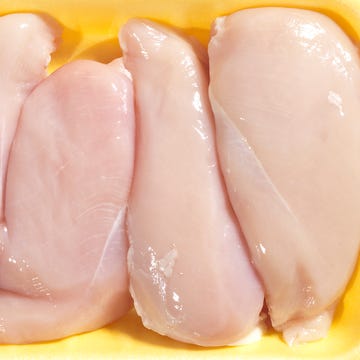1. Placing raw meat on an upper shelf
 Media Platforms Design Team
Media Platforms Design TeamNext time you're defrosting packets of ground beef or chicken breasts, don't put them on the top shelves. Meat juices could seep out and drip on the food below, contaminating it. (Higher shelves also tend to be warmer than lower ones.) Instead, put meat in a plastic bag, bowl, or pan and store it down below.
2. Overstuffing it
 Media Platforms Design Team
Media Platforms Design TeamTo some, a packed fridge is a sign of abundance. To a microbiologist, it's a day of diarrhea waiting to dawn. The reason? Cold air needs to circulate to keep food chilled and bulldoze bacteria, and it can't do that in a crowded environment. Plus, in an overstuffed fridge, it's hard to tell what's fresh and what's been in there since the Reagan administration.
3. Keeping the temp in the danger zone
 Media Platforms Design Team
Media Platforms Design TeamWhen was the last time you checked the temperature in your fridge? Do you even know where the thermometer is? If you answered, "I don't know" to both those questions then you could be setting the stage for a bacterial invasion. Microbes thrive in temperatures above 40°F, so it's crucial to keep the fridge temp between 32° and 40°F and the freezer temp below 0°F. If your fridge is an older model without a built-in temperature gauge, buy a thermometer, put it on a shelf, and check it regularly. And don't stand there with the door open, trying to figure out what to eat. That raises the temp even more, especially during warm weather.
Advertisement - Continue Reading Below
4. Putting fruits and veggies in the same crisper
 Media Platforms Design Team
Media Platforms Design TeamYou can't make produce last forever but there are two things you can do to keep bacteria at bay for longer. First, don't wash fruits and vegetables until you're ready to use them (bacteria love moisture). Second, keep your produce in separate crispers. Fruit emits ethylene, a gas that hastens spoilage in vegetables. (Follow these tips to make your produce even healthier.)
5. Storing eggs in the door
 Media Platforms Design Team
Media Platforms Design TeamAs hard as it is to resist placing eggs in those sculpted shelves (they're so handy), experts say it's the worst place to put them because it's too warm. Instead, keep eggs in their original carton toward the back of the fridge where temps are coldest. (Check out these 6 other egg safety essentials.)
6. Returning poured milk to the original container
 Media Platforms Design Team
Media Platforms Design TeamYou may think nothing of pouring your child's unfinished milk back into the carton. Yuck. That leftover stuff may have picked up god-knows-what, which when returned to the container could cause spoiling or food poisoning. Just get rid of it, or pour less to begin with. And always keep dairy in the back of the fridge where it's coldest. That will also discourage members of your household (we won't name names) from drinking out of the container, a habit that's nasty and unhealthy. Germs from that person's mouth can be passed to others, especially if "that person" is fighting a cold or the flu.
Advertisement - Continue Reading Below
7. Cleaning your fridge once a year
 Media Platforms Design Team
Media Platforms Design TeamScouring the icebox is never at the top of anyone's weekend to-do list, but putting it off can be dangerous. Microbes flourish on crusty ketchup lids and sticky jam jars, in spilled soup, moldy lunch meat, and rotting produce. Experts recommend a weekly cleaning, especially for the crispers and where you store your meat. Use hot, soapy water or a mix of vinegar and water. And don't forget the outside: Vacuum around the grille and motor to suck up the dust that keeps your trusty appliance from running efficiently and doing what you bought it for in the first place—keeping your wine pleasantly chilled.
MORE: 6 Things You Should Be Cleaning WAY More Often Than You Do
Advertisement - Continue Reading Below
Advertisement - Continue Reading Below
Advertisement - Continue Reading Below














